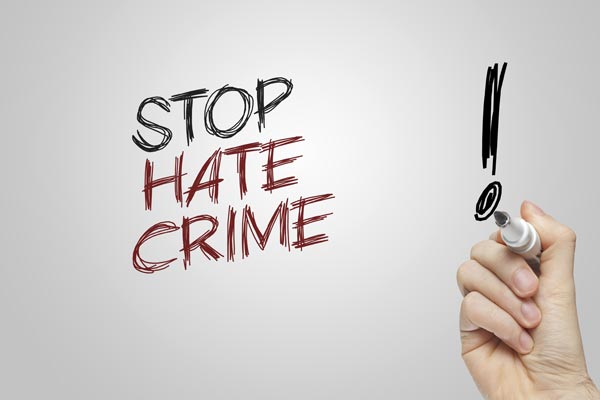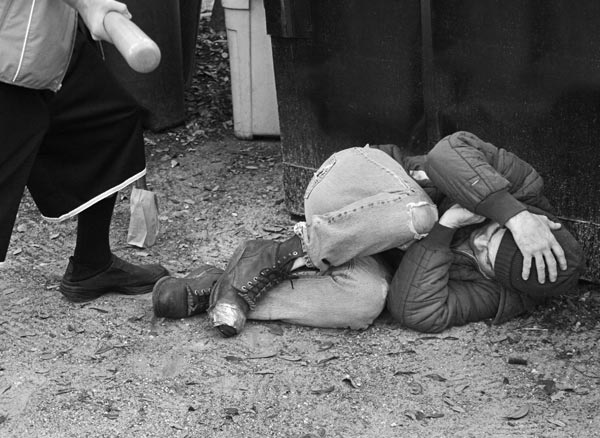Hate crimes are any crimes motivated by bias and prejudice against a person’s:
- Religion
- Race
- Skin color
- Ethnicity
- Sexual orientation
- Gender identity
- Disability

What Are the Most Commonly Targeted Groups for Hate Crimes?
The FBI’s Uniform Crime Reporting Program collects data from law enforcement agencies on hate crimes. In 2018, they collected data from more than 16,000 agencies, reporting 7,120 incidences of hate crimes. Among those, they found the following biases to be most prevalent:
- Race/Ethnicity/Ancestry (59.6%)
- Religion (18.7%)
- Sexual Orientation (16.7%)
- Gender Identity (2.2%)
- Disability (2.1%)
- Gender (0.7%)

Why Do Hate Crimes Go Unreported?
Hate crimes are complicated both for law enforcement and for the victims. The Department of Justice studied the reasons why hate crimes go unreported:
- Victims may not be aware that the crime constituted a hate crime or may not know what the hate crime laws are in their state.
- Victims may not communicate that the crime could have been motivated by hatred or bias.
- Victims may hesitate to report these kinds of offenses at all.
Which States and Territories Do Not Have Hate Crime Laws and Do Not Require Collection on Hate Crimes?
Hate crime laws vary by state. Some states have stringent hate crime legislation, while some have none at all. The following states and territories do not have hate crime legislation in their criminal justice systems and do not collect information on hate crimes:
- American Samoa
- Arkansas
- Georgia
- Guam
- Northern Mariana Islands
- South Carolina
- U.S. Virgin Islands
- Wyoming
In those states and territories, federal legislation can still protect people who have been victims of hate crimes even if the state does not.
What Are Some Federal Hate Crime Prevention Laws?
Federal legislation regarding hate crimes includes:
- The Matthew Shepard and James Byrd Jr. Hate Crimes Prevention Act of 2009 – This federal act criminalizes assault that causes bodily injury or assault with a weapon motivated by hatred of race, skin color, religion, or ethnicity.
- Criminal Interference with Right to Fair Housing – This law criminalizes the use of force to impede the right to fair housing based on race, skin color, religion, gender, disability, family status, or ethnicity.
- Damage to Religious Property, Church Arson Prevention Act – This law criminalizes causing damage to property based on the religious quality of the property or because of the race, skin color, or ethnicity of the people associated with the property. It also criminalizes the forceful obstruction of people’s right to practice their religion freely.
- Violent Interference with Federally Protected Rights – This legislation criminalizes the forceful interference of people’s federally-protected rights, including employment, education, jury participation, travel, or the use of public services because of their race, skin color, religious affiliation, or ethnicity.
- Conspiracy Against Rights – This law criminalizes conspiracy by two or more people to use force against another person to prevent them from exercising their Constitutional rights or rights granted by U.S. law.
What Motivates Someone to Commit a Hate Crime?
To understand criminal acts, researchers often categorize perpetrators into categories based on motivation. Levin and McDevitt created the most widely used and accepted categories in which they outline four types of motivations:
- Thrill-seeking (66% of offenders) – motivated by power and excitement.
- Defensive (25% of offenders) – motivated by protection of their “turf.”
- Retaliatory (8% of defenders) – motivated by vengeance for a perceived affront or offense.
- Mission (1% of offenders) – motivated by the desire to eradicate groups believed to be inferior or evil.
What Are Potential Penalties for Hate Crimes?
Hate crime laws and potential punishments vary between states, and each individual hate crime is unique. Hate crimes are also typically charged in conjunction with other crimes. The details of each case, along with state law, determine the punishments, but hate crimes typically carry a maximum prison sentence of ten years.
Fair Fight Initiative Summary About Hate Crimes
As America struggles with the role of police in society, one response here in Georgia has been to revive a discussion about “hate crime” legislation. The response is a direct result of the murder of Ahmaud Arbery, a 25 year old Black man chased and killed by armed white residents of a south Georgia community. The failure of police to arrest the perpetrators, and three different prosecutors to bring charges, exposed a criminal justice system that seemed to work for white victims, but not for people of color. This guide discusses so-called “hate crimes” as a possible step to a fairer criminal justice system.
How You Can Help
The Fair Fight Initiative opposes injustice in all its forms, including hate crime offenses. Through the support of donations, the Fair Fight Initiative litigates and engages in other advocacy to raise awareness and defend hate crime victims and others who seek justice for inhumane and unfair treatment in the legal system.
By donating to Fair Fight Initiative, you can help us fight for a legal system that truly reflects the ideals of freedom and justice.
If you feel you’ve been the victim of a hate crime, please submit an application for assistance from the Fair Fight Initiative. All accepted cases will be litigated for little to no cost through our fundraising efforts. We receive many applications, so please be aware that responses may be delayed.
Approved cases will be documented and litigated with funds generated by our nonprofit. Fair Fight Initiative receives many applications, and responses may take many weeks.
